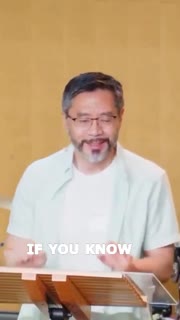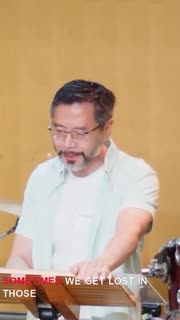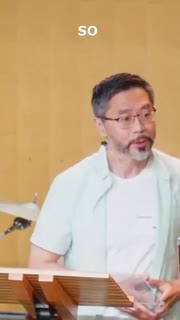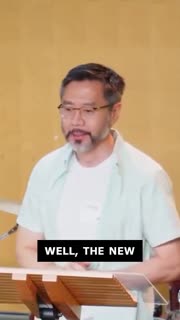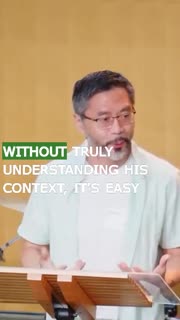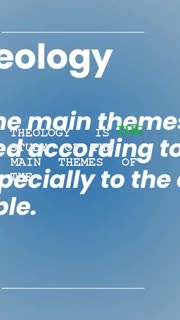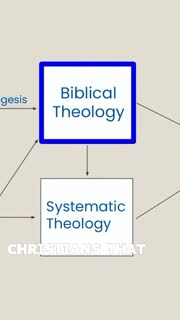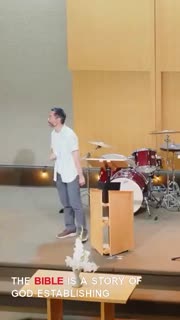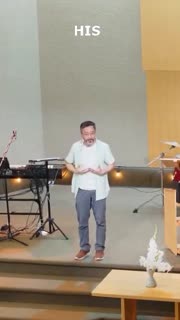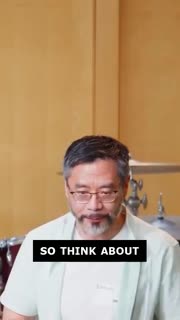Understanding the Bible: The Jigsaw Puzzle Analogy
Devotional
Sermon Summary
Bible Study Guide
Sermon Clips
1. "If you know where the big picture is, you can fit the little pieces in. You can fill in that whole puzzle. You can finish that puzzle much easier with much less energy. That's probably the most important strategy. Even if you don't know exactly where that piece is on that box, you can kind of tell where it's going to go by looking at that box. When you know the big picture, you know where you're going." [01:03] (29 seconds)
2. "Sometimes we get lost in those individual pieces. But we fail to see that big picture, the big story. Well, in these next three months, that's our task. It's to understand that big story. To see that whole picture, which is the Bible. We're calling this series Old Testament Theology, a new look at the old story." [01:58] (29 seconds)
3. "So it's incumbent upon us, to really understand the Bible, the Old Testament story. That's our task for the next three months, understanding the main themes of the Bible, especially the Old Testament. And we're going to look through the narrative, the story of the Old Testament, from Genesis through to Nehemiah. But of course, it's not just understanding the past for the past's sake, right? We learned that this past summer. We don't learn history or the past just for the sake of the past. But we learn history. And we're learning it so that we understand ourselves." [02:55] (37 seconds)
4. "Well, the New Testament and Jesus are like that. Last piece in the puzzle. Of course, more important than a single piece, but it helps us make sense of that entire puzzle. That's what Jesus and the New Testament are like. That central piece that helps us understand the entire puzzle. Well, it's equally true that the rest of the puzzle helps us understand that central piece. Without the Old Testament, Jesus and the New Testament have no puzzle. They have no context." [04:41] (38 seconds)
5. "Without truly understanding his context, it's easy for us to misunderstand who Jesus is and therefore also be misled potentially about who Jesus is. And what we call this, in terms of theology, we call this biblical theology. Old Testament theology in particular as an aspect of biblical theology." [07:37] (18 seconds)
6. "Biblical theology is the study of the main themes of the Bible, organized according to the structure of the Bible, with a view especially to the overall story of the Bible. Let me just read that one more time. Biblical theology is the study of the main themes of the Bible, organized according to the structure of the Bible, with a view especially to the overall story of the Bible." [13:56] (24 seconds)
7. "We believe as Christians that God has spoken, God has revealed something to us. That's what distinguishes Christianity from many other religious expressions. That God has actually spoken. That Jewish, Islam also believes that through their Quran, through Muhammad. But for Christians, we believe that the text is supreme. That God has spoken through the text. So that becomes the foundation of all of our understanding of truth." [14:30] (28 seconds)
8. "The Bible is a story of God establishing his rule, his authority, his kingship, his kingdom in this world. And foremost, his kingship in the hearts of people, which are most resistant to his rule in creation. Is that not true? We, human beings, are the most resistant to his rule in creation, or have been. That's why C is the correct answer. The story of God establishing his rule in this world." [22:00] (38 seconds)
9. "We are meant to be his kings and queens over this earth. Over the rest of this planet. That's who we are meant to be. He is going to reign through his creation. Through us. Through us. Right? That's how lofty and ideal this statement is. We are his kings. We are his queens. We are his regents. That's where that word comes from. We are his representatives on this earth." [28:05] (38 seconds)
10. "So think about whatever situation that you are in. That you find yourself. You have the same kind of calling. To seek the welfare of the community. In which you are part. The neighborhood of which you are part. The city of which you are part. This country of which you are part. Because you have a calling beyond just that place. But accountable to the Lord." [33:22] (27 seconds)
Ask a question about this sermon
2. "Sometimes we get lost in those individual pieces. But we fail to see that big picture, the big story. Well, in these next three months, that's our task. It's to understand that big story. To see that whole picture, which is the Bible. We're calling this series Old Testament Theology, a new look at the old story." [01:58] (29 seconds)
3. "So it's incumbent upon us, to really understand the Bible, the Old Testament story. That's our task for the next three months, understanding the main themes of the Bible, especially the Old Testament. And we're going to look through the narrative, the story of the Old Testament, from Genesis through to Nehemiah. But of course, it's not just understanding the past for the past's sake, right? We learned that this past summer. We don't learn history or the past just for the sake of the past. But we learn history. And we're learning it so that we understand ourselves." [02:55] (37 seconds)
4. "Well, the New Testament and Jesus are like that. Last piece in the puzzle. Of course, more important than a single piece, but it helps us make sense of that entire puzzle. That's what Jesus and the New Testament are like. That central piece that helps us understand the entire puzzle. Well, it's equally true that the rest of the puzzle helps us understand that central piece. Without the Old Testament, Jesus and the New Testament have no puzzle. They have no context." [04:41] (38 seconds)
5. "Without truly understanding his context, it's easy for us to misunderstand who Jesus is and therefore also be misled potentially about who Jesus is. And what we call this, in terms of theology, we call this biblical theology. Old Testament theology in particular as an aspect of biblical theology." [07:37] (18 seconds)
6. "Biblical theology is the study of the main themes of the Bible, organized according to the structure of the Bible, with a view especially to the overall story of the Bible. Let me just read that one more time. Biblical theology is the study of the main themes of the Bible, organized according to the structure of the Bible, with a view especially to the overall story of the Bible." [13:56] (24 seconds)
7. "We believe as Christians that God has spoken, God has revealed something to us. That's what distinguishes Christianity from many other religious expressions. That God has actually spoken. That Jewish, Islam also believes that through their Quran, through Muhammad. But for Christians, we believe that the text is supreme. That God has spoken through the text. So that becomes the foundation of all of our understanding of truth." [14:30] (28 seconds)
8. "The Bible is a story of God establishing his rule, his authority, his kingship, his kingdom in this world. And foremost, his kingship in the hearts of people, which are most resistant to his rule in creation. Is that not true? We, human beings, are the most resistant to his rule in creation, or have been. That's why C is the correct answer. The story of God establishing his rule in this world." [22:00] (38 seconds)
9. "We are meant to be his kings and queens over this earth. Over the rest of this planet. That's who we are meant to be. He is going to reign through his creation. Through us. Through us. Right? That's how lofty and ideal this statement is. We are his kings. We are his queens. We are his regents. That's where that word comes from. We are his representatives on this earth." [28:05] (38 seconds)
10. "So think about whatever situation that you are in. That you find yourself. You have the same kind of calling. To seek the welfare of the community. In which you are part. The neighborhood of which you are part. The city of which you are part. This country of which you are part. Because you have a calling beyond just that place. But accountable to the Lord." [33:22] (27 seconds)
